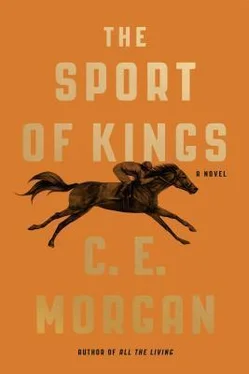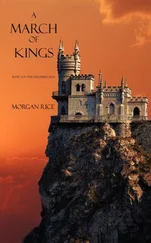Hellsmouth interrupted his planning. She was stamping her impatience on the aluminum floor of the Turnbow, jutting her nose against the glass of the window. She swung her truculent head toward him when he pulled the ramp and unhitched the swinging door. She was here in this world as much as he was, and he would do well to remember it.
As he guided her out — and how good it felt in his shoulders, his hands, his whole being to handle his animal, the way it had felt when he was a younger man and racing was new to him, when the adventure of life was still largely to come — Hell seemed to have grown a hand on the journey. She loomed over him, her head swiveling on the tower of her neck, taking the farm in round. An uncontained shiver looped across her withers and under her girth. This was her old playground, and she recognized it, so she wouldn’t come placidly. She was barking like a seal, dancing up on springy legs that reminded Henry, not for the first time, of dark and knotty rose stems.
Good sense dictated that he install his champion in the foaling barn far from the wild stimulus of the fields, let her recalibrate to the freedom of the farm, a freedom near limitless against her life on the track. But she had other plans and pulled Henry across the brick chip lane to the old paddock where she had once nursed greedily, where she had gamboled as a weanling in the simple restraint of a nylon halter, where she had gazed across rumpled earth like the sides of green bells to the eastern mountains with their black interstitial valleys and glinting rivers. She knew this was where she belonged.
When Henry clipped her off the lead, Hell rocketed out into the field, her aluminum shoes blurring arcs that trampled timothy grass and tossed turf. Reaching the center of the paddock, she kicked out with the silliness of a goat, then jumped once and turned, her conformation showing out speed and stamina, the Remus and Romulus of her sport. She snorted, then gathered herself up and, with a triumphant leap, began to run. Henry reached for the top rail, suddenly terrified that she would drive herself through the fencing into the safety lane and reopen her chest or break her own bones. Instead, she cut savagely left at the first corner and traced a round in the falling light, beating a retrograde path, brightening in evening’s light and accelerating as she neared Henry like a heavenly body in egress. Her hooves reverberated into the roots of the trees.
Henry stepped away from the fence with his mind suddenly clear: If you closed every racetrack in the world, hung every bridle and threw open every paddock, horses would still race one another on the open plain. It was inevitable, undeniable, because their competition was innate. The greatest dreams of humans were nothing but clumsy machinations next to the natural ambition of animals.
Hell had barely slowed when Henry returned to the truck, where Samuel remained placidly asleep, exhausted by the excitement of the day. Henry drew up the bundled baby, but a question appeared suddenly in his mind, which had become like an empty room.
What if he had been born out on the tableland in a modest white farmhouse in Emerson, Nebraska, the child of landlocked Swedes, who told him, “This land will never make you rich. True wealth is in the hope for simple things. Son, work the land, dote on your children, and ease your elders into gentle deaths.”
Or, what if he had been born a fisherman in Mobile? What if he’d folded himself into his boat every morning and pressed out against the tide, trawling for tiny swimmers to feed to his neighbors, and did this every day for sixty years until his anonymous death, knowing nothing resembling worldly ambition, only the land and the sea and the land and the sea, and wanting nothing more?
But he, Henry Forge, had not been born into those lives. He had been born into this indelible life. This was his grandson against his chest and this was his diaper bag in his left hand. And this here was his kitchen door, which his father, that old colossus, had slammed again and again in frustration over the course of decades. Henry could not now bring himself to walk through that door, to reenter history. Not yet. Evening flooded everything. Final ruby light plunged across the pastures. It filled every corner of his senses. He had been favored by fate to live on this plot of land his entire life, as rooted as any plant. But for the plant there was no ambition, and so no madness into which it needed to descend to cut through the confusion of daily living, the crass noisemaking of everyday speech, the rapidity of time’s passage and its pseudolosses — what the human called its losses.
The flora and the simple fauna, they had no fathers, only genetic predecessors, and because they had no fathers, they had no stories, and because they had no stories, they didn’t suffer any notion of themselves. In the landscape behind his eye, Henry fashioned a prairie of purple coneflowers, lovely and indistinguishable. He imagined the absurdity of one flower asserting its singularity, its glory, yearning to stand a hard-won inch above its nearest neighbors, straining on its flimsy stalk, flailing its petals, whispering in a hoarse, pollen-choked voice, “Me! Me! Me!”
Ambition is a form of suicide if it kills the simple self.
He looked down into Samuel’s face. What do you know, Henry? His mind no longer howled with a grief that obscured fact; he had no more strength left to resist naked realization. There were galaxies in the body of every man and woman; Henrietta’s had gone unexplored. He had flung her life away before her death. And he had mistaken the black body for a beggar’s suit. Until today, until he had brought Samuel into the rain-washed open air of Churchill Downs, he had never rebelled against his father, not really.
What he knew could barely fill a teaspoon, and it looked mostly like hope: Samuel’s diaper would be dirty again shortly, he would wake once during the night, there would be a few more ear infections, then he would begin to crawl and come rounding along the el porch on a shiny red bicycle his grandfather had bought him, he would read many books full of useless information, then make love with a woman and have a child, succeed at something, fail at many more things, argue perhaps to the point of breaking with his own child, then stoop and shrivel and go slack on some hospice bed somewhere, his eyes wide with Lavinia’s disappointed wonder.
Still, Henry did not reach for the door. Though his body was exhausted — never more so — his mind was not fatigued. In his arms, Samuel was making the kittenish sounds of waking. In a minute or two, they would pitch headlong into a darkly blue night. But Henry’s race was not yet run. There was still something to be known, something that arrested his movement. His mind pressed forward, grappling for it; he could feel the ache of its muscular exertions.
He might be a fool, a climber, a dreamer, supremely guilty, maybe he was even evil, yet hadn’t he preserved the perfection of this land? Who else but the Forges and their ilk had done this, could do this? The poor of the earth were the tramplers of the earth, and that was the truth. Give them a beautiful thing and they would foul and wreck it. One last time, the old fire reasserted itself: Why should he, Henry, restrain himself? He was not the child of immigrants, not a fisherman, not a simple, unremarkable flower in a field. Look at what he had built; look at what he alone had made from the mud of his will and the mortar of his desire! If he was indeed a member of the animal kingdom — and he would grant that he shared something with the crude and base animal — why should he restrain himself when restraint was required of no other beast? The dogs rutted in the yard and the lions slaughtered the antelopes. The owl was as ruthless as the rattlesnake and so on and so on. Even the earth obeyed the demands of its nature: it snatched everything, absolutely everything, whether mountain or beast or daughter, back to its breast. Human beings alone were capable of greatness. Only they could even conceive of greatness. So he had stomped on necks, so he had used his daughter. He had grown rich in the wild capitalism of life! Those incapable of greatness despise greatness the most; theirs were the loudest voices denying its very possibility.
Читать дальше
Конец ознакомительного отрывка
Купить книгу












